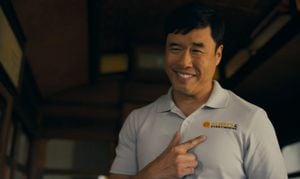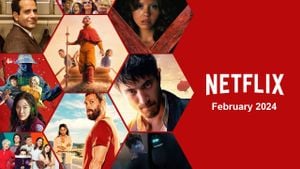When it involves powerhouse names in Hollywood, few can match the combined influence and charm of Oprah Winfrey and Denzel Washington. Recently, their collaboration has reignited conversations among film enthusiasts about the hidden gems of cinema. A closer look at their work together reveals not just the brilliance of these icons but also the spirit of storytelling they both champion.
Denzel Washington, known for his commanding presence and electrifying performances, has made a mark as not just an actor but also as a director. With accolades ranging from his powerful portrayal of Malcolm X to his recent role in "Gladiator II," Washington seamlessly weaves his acting prowess with behind-the-camera endeavors. But one of his notable directorial achievements that's often overshadowed is the 2007 film "The Great Debaters," which not only features Washington as the lead but also carries the influential stamp of producer Oprah Winfrey.
Washington’s charisma shines through as Professor Melvin Tolson, who instructs the debaters at Wiley College, historically known for its all-Black student body. Through his skillful control of speech—something honed during his theatrical training—Washington embodies the passion of his character. His lines carry weight, not just for their content, but also for the decades of struggle and resilience they represent.
Interestingly, "The Great Debaters" emerged as Oprah Winfrey's labor of love. Her production company, Harpo Films, had been striving to bring this story to the screen for nearly ten years. Winfrey was captivated by the real-life events surrounding the Wiley College debate team, which stood as a beacon of hope during the racially charged 1930s. She describes the film as one that's bound to inspire viewers, offering them moments of exhilaration and joy. Winfrey recalls, "It’s the type of movie you stand up and cheer for," capturing the essence of underdog triumphs.
The film’s narrative not only highlights the fierce competitions but also the importance of intellectualism and education within African American communities, particularly during times of systemic oppression. Students from such backgrounds were often doubted, yet the Wiley College debaters dared to challenge the status quo. The story entrenches the audience within this historical edifice, making it relatable and relevant even today.
Despite their dedication, the road to production was fraught with challenges. Notably, the family of Melvin Tolson took legal action against Harpo Films, claiming compensation was owed for utilizing his life story. While the lawsuit didn’t succeed, it highlighted the contentious nature of storytelling, particularly surrounding African American histories often silenced or overlooked.
Washington himself has always championed nurturing future generations, paralleling the mentorship he portrays in the film. Reflecting on his love for teaching, he states, "I love seeing other people do well. Nothing gives me greater joy than watching... I grew up coaching kids, which was my life's work before acting." Such statements offer insight not only back to his character but also to his personal ethos.
While "The Great Debaters" may not boast the visual flair of other films, its strength lies decidedly in its intelligent writing and performances. It is here where both Winfrey's vision and Washington's execution converge. They convey the deep-rooted importance of story as both art and education. Warping together sharp dialogues and stirring moments, the film stands as both historical retelling and poignant drama.
One cannot forget the remarkable poetry recited throughout the film, breathing life to Langston Hughes and Countee Cullen’s words. These elements enrich the narrative, showing how language and debate acted as vessels for empowerment. Finding the rhythm to articulate arguments mirrors the very real struggles of those who historically have fought for their voices to be heard.
These themes extend beyond entertainment, challenging viewers to reflect on systemic inequalities and their repercussions. The collaborative efforts of Washington and Winfrey not only shed light on this inspirational story but also invite audiences to engage with narratives around race, identity, and resilience.
Perhaps it is their shared commitment to storytelling and uplifting marginalized voices through film, much like the inspiring tale portrayed within "The Great Debaters," which makes their partnership so compelling. Washington and Winfrey embody resilience, whether on screen or off. Their collaborations have the power to provoke thought, instigate change, and inspire hope—truly the hallmark of remarkable storytelling.
From the stage of theatrical endeavors to the silver screen, Washington's commanding demeanor coupled with Winfrey's visionary production prowess creates unforgettable moments for the audience. Every scene reflects the challenges faced not just by the characters but also the real people behind the narratives. It is this very intersection of history, legacy, and storytelling artistry where the brilliance of Winfrey and Washington truly shines.
So, as we eagerly await the next chapter this dynamic duo might pen together, the appreciation for their previous works grows. "The Great Debaters" may have come and gone, but its essence remains alive, urging viewers to embrace the power of education, words, and hope.



